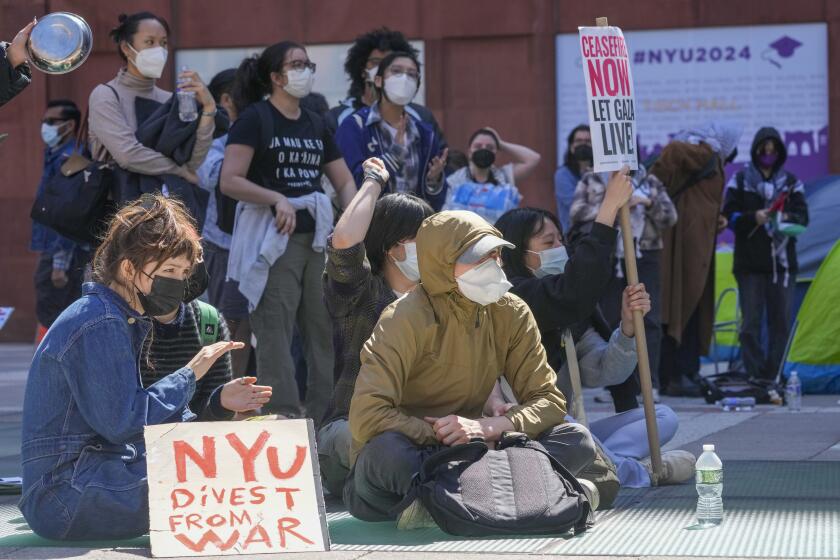PERSPECTIVE ON SARAJEVO : History Turned on Its Head : In Sarejevo, it is Jews reaching out to save Christians and Muslims, providing needed food, shelter and medicine.
Before 1991, Ivan Ceresnjes and Jacob Finci were among Sarajevo’s professional elite. These 40ish men spent their boyhoods growing up around the Jewish community center not far from the old Turkish quarter. After college, Ceresnjes became a successful architect and Finci was one of Bosnia’s leading corporate attorneys. They had large families, roomy apartments and vacation homes at the beach.
But as Sarajevo Jews, they were born in the shadow of history. Eighty percent of this community’s 12,000 members were murdered in World War II, and nearly all who survived did so because others risked their lives to save them. Finci’s family had been hidden by Italians. Ceresnjes’ father fought with the Americans in North Africa. Nine hundred seventy Sarajevo Jews fought with Tito’s Partisans; 340 of them died fighting. Very few returned in 1945 to rebuild their community, but those who did carried the lessons of the war deep within them. Half a century later, they put those lessons to use.
Ceresnjes was elected president of the 1,200-member Jewish community in 1988. As Yugoslavia rapidly disintegrated, he and Finci quickly strengthened ties to Jewish organizations in the West, at the same time refusing to mix in Croat, Serb or Muslim political circles. When community members asked which side they would be taking, the two would respond, “We see only the good, the very good and the very, very good.” Perhaps they saw otherwise, but they have never said so publicly.
By the time Sarajevo had been encircled in May, 1992, the majority of its Jews had been airlifted out by the American Jewish Joint Distribution Committee, which also helped stock every nook and cranny of the community center with food and medicine. The committee, which receives a large percentage of its funds from Los Angeles through the Jewish Federation Council, helped Sarajevans set up a Jewish humanitarian-aid society--La Benevolencija--with Finci as its president.
Once the shelling started, Ceresnjes had his old local suppliers replace the synagogue’s windows with plastic. Propane stoves were set up in the lounge. A medical clinic was built upstairs, and its doctors established barter relations with every hospital in town. And as the war dragged on, when Jews wanted out, Finci used his considerable negotiating skills with Muslims, Croats and Serbs. One thousand Jews have left the city on La Benevolencija’s convoys. Finci also negotiated to bring in food and medicine. Whenever he met the various factions, he carried the same message: “We’re Jews. This is an ethnic conflict that doesn’t concern us. We can help everyone. But you’ll have to let us.” For some reason, they listened, and are listening still. Croats, Bosnian Serbs, Bosnian Croats, the U.N. force and the Bosnian government all respect Sarajevo’s Jews and allow their transports access.
Three years into this bloody siege, most Jews have left Sarajevo. This should mean that the community has ground to a halt. Not so. Ceresnjes and Finci insist they have 500 members “with papers to prove it.” One could question their math. But not when 350 people have a hot, free lunch at the community center daily. Not when 320 individuals are given food packages to take home very week. Not when 40% of all of Sarajevo’s medicine has been distributed--free--from the synagogue. Not when six doctors and nurses call on people at home, no matter if they are Muslim, Croat or Serb. Not when community leaders bring in thousands of letters at a time from the outside world, then phone Sarajevans who run across town braving gun fire to pick them up. And not when 54 volunteers--Serbs, Croats, Muslims and Jews--all come to work together in a faded pink synagogue every day of the week.
For more than 10 years, I have been photographing Jews in Central Europe and the Balkans. I have seen much that is sad, but I have also learned that even though the great Jewish communities here no longer exist, those Jews remaining have come to despise labels like “last Jews” and “remnant communities.” After all, dignity is not predicated on numbers. In Sarajevo, I have documented a tiny Jewish community as it opened its doors to an entire city. In this war, Jews are not the victims. In this war, Jews are not the oppressed. In this war, Jews are saving Christians and Muslims, wherever, whenever they can. History--thank God--has been turned on its head.
More to Read
Start your day right
Sign up for Essential California for news, features and recommendations from the L.A. Times and beyond in your inbox six days a week.
You may occasionally receive promotional content from the Los Angeles Times.






